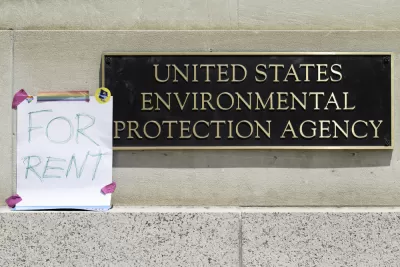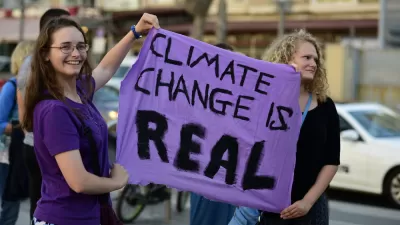An even set in motion years ago by the Trump administration came to fruition on November 4 while most Americans were paying attention to the election.

Brady Dennis, Juliet Eilperin, and Dino Grandoni report that the United States officially "became the first and only nation to withdraw from the Paris climate accord on Wednesday, even as the outcome of the presidential race remained unknown."
With the result of the presidential election still undetermined, the direction of the United States as a global partner in the effort to reduce carbon emissions before the worst projections for climate change and sea-level rise are impossible to avoid hangs in the balance. A Trump victory would mean years of stagnation on climate action in the United States.
Here's what the climate status quo looks like in the United States, according to the article:
The United States could miss its own Paris accord commitment to lower carbon emissions 26 percent to 28 percent below 2005 levels by 2025. According to an analysis by the Rhodium Group, the country is on track to cut its emissions between 20 and 27 percent, depending on how quickly the economy recovers from the pandemic. But it would need to cut emissions by 43 percent over the next decade to be on track to reach net zero emissions by 2050 — a goal that the European Union, Japan, South Korea and other nations have set in a push to slow the world’s warming.
The two candidates for the presidency would "undoubtedly lead the country in opposite directions on climate policy.
"But even as the electoral map appeared to tilt in Biden’s favor Wednesday, signs pointed toward the GOP retaining control of the Senate," according to the article. "That outcome would dim the prospects that a Biden administration could shepherd a comprehensive climate bill through Congress."
FULL STORY: As U.S. leaves Paris accord, climate policy hangs on election outcome

Planetizen Federal Action Tracker
A weekly monitor of how Trump’s orders and actions are impacting planners and planning in America.

Congressman Proposes Bill to Rename DC Metro “Trump Train”
The Make Autorail Great Again Act would withhold federal funding to the system until the Washington Metropolitan Area Transit Authority (WMATA), rebrands as the Washington Metropolitan Authority for Greater Access (WMAGA).

The Simple Legislative Tool Transforming Vacant Downtowns
In California, Michigan and Georgia, an easy win is bringing dollars — and delight — back to city centers.

The States Losing Rural Delivery Rooms at an Alarming Pace
In some states, as few as 9% of rural hospitals still deliver babies. As a result, rising pre-term births, no adequate pre-term care and harrowing close calls are a growing reality.

The Small South Asian Republic Going all in on EVs
Thanks to one simple policy change less than five years ago, 65% of new cars in this Himalayan country are now electric.

DC Backpedals on Bike Lane Protection, Swaps Barriers for Paint
Citing aesthetic concerns, the city is removing the concrete barriers and flexposts that once separated Arizona Avenue cyclists from motor vehicles.
Urban Design for Planners 1: Software Tools
This six-course series explores essential urban design concepts using open source software and equips planners with the tools they need to participate fully in the urban design process.
Planning for Universal Design
Learn the tools for implementing Universal Design in planning regulations.
Smith Gee Studio
City of Charlotte
City of Camden Redevelopment Agency
City of Astoria
Transportation Research & Education Center (TREC) at Portland State University
US High Speed Rail Association
City of Camden Redevelopment Agency
Municipality of Princeton (NJ)





























